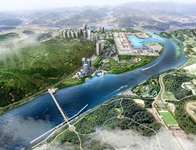
Lee, Jae Oh
Member of National Assembly
The Grand National Party HANNARA
Controversy is hot on the Korean peninsular Great Canal(KPGC). It would be strange if it were otherwise especially on an endeavor of such a scale that calls upon the entire capacity of a nation. However, we must start considering the KPGC as not a simple “Canal construction”. Not as constructing a canal that sends loaded boats from the Han River to the Nakdong River through connected waterways, but understanding it as a national project for the prosperity of Korea.
During the presidential election last year, I traveled all of the Great Canal’s branches
starting from Eulsookdo located at the end of the Nakdong River to the Han River and across Mt. Sobaek. I wanted to see and feel first hand if the Great Canal could right our nation’s tilted fate. Although vague, simply concluded, the Great Canal must be created.
The Great Canal is more that simply reinstating boat ways. It is about mending our neglected lands, securing tourist resources by managing and using this waterway, and mass-shipping the increasing amount of moving cargo in an environmentally friendly way.
In our country, 89 percent of cargo transportation on land is made up of truck shipments between Seoul and Busan. If the same amount of fuel is used, one can go 300 km by railroad and 370 km by ship while trucks can only 100 km.
In Europe, the Europe Council in 2001 predicted that cargo transportation on land would increase 50 percent in 10 years(2010) and instated the Marco Polo Plan as an effective traffic policy to solve problems regarding land traffic confusion, road construction costs, and environmental harm. It is and expansion of modal shift acting as countermeasure against rising oil prices. The EU has invested 35 million euros(approximately 49 billion won) for five years since 1997 and at present, Marco Polo Plan two in which 400 million euros(approximately 560 billion won) will be invested until 2013 is underway. The EU expects an annual 600 million euros(approximately 840 billion won) in benefits because of this program due to decreases in environmental harm, accidents, and energy consumption. According to predictions made by the Ministry of Maritime Affairs and Fisheries, the amount of moving cargo will increase twofold by 2020 compared to 2005 and containers will increase threefold. In an age when oil prices are sky-high, it can save an annual 25.5 million barrels and 55 billion won in carbon dioxide pollution. Furthermore, accounting for the overpacked road situation, cargo-shipping via the Great Canal is a must.
Let’s think further. The most important thing for this is an advanced distribution industry cluster centered on distribution networks and a consumer city built in living quarters is essential. The Great Canal project can solve this. It would be possible to form suitable cluster complexes in the different areas, reduce overall distribution costs through the deindustrialization of distribution
by forming industrial complexes near the canal, and naturally commence inland balance and area specialization if distribution, living, and educational facilities are formed.
Let’s consider the benefits vs. costs(B/C). According to data from the Korea Water Resources Corporation in 1998, although the B/C disregarding the ripple effect on the economy was 0.948, the recently talked about governmental report tampered with the B/C clause increasing the costs and reducing the benefits and announced a modified B/C statistic of 0.16 to the people.
The construction industry, which endures criticism by the Great Canal critics as an old-fashioned industry, is an industry much more influential than any other industry in terms of employment, production, and the citizen welfare economy. We must not ignore the fact that investment in the lagging construction industry is directly connected to economic growth. Also, the distribution industry is a new growth industry for our nation to become a leader in distribution in Northeast Asia. Through the Great Canal, the lagging construction industry will be revived and if growth is achieved trough revitalizing the distribution industry, I am positive that common economy will also bloom.
We must not see the Great Canal as a construction project that tunnels through mountains and connects waterways. Construction, distribution, advanced IT, shipbuilding, steel, tourism and all other national industries will be united to become a national project to reawaken our economy. Instead of criticizing through shades, we need a healthy debate through a macro point of view.
Translated by Lee Shin-young

Ahn, Byungok, Ph. D.
Secretary General Korean Federation for Environmental Movement
Friends of the Earth Korea
The ghost of the Korean Peninsular Great Canals floats around. It is an uncertain project that has not even decided on its route. Especially since the purpose of its construction has passed constantly from distribution to water refinement to tourism and inland development, this is a very laughable endeavor. If the Suez Canal or the Panama Canal were to be dug, no one would find that strange. However, in a country with a
long peninsula geography, it is the height of folly to dig a canal the length of the country. For the following reasons, the Korean Peninsular Great Canal (KPGC) may potentially destroy our country’s future.
1) Canals are the past’s transportation method. Only in European countries like Germany, the Netherlands, and Belgium use canals as a means for inland transportation and other countries rarely or never even use them. In fact, of the 15 main members of the EU, nine including England, Italy, Sweden, and Spain are close to zero in terms of canal cargo transportation. These countries share the characteristic that they are mostly island or peninsula countries. Furthermore, the portion inland canal transportation holds is only four percent. There is no reason in the knowledge information era of the 21st century to waste national strength on old-fashioned engineering endeavors that Europe used hundreds of years ago.
2) In the economic structural point of view, canal building is against the trends of this age. Canals are fit for shipping bulk cargo like coal and steel long distances. The axis of production, however, has moved from steel and coal to small light products like microchips and machine parts long ago. The slow barges used on canals are not appropriate for quickly shipping today’s high-tech products.
3) The KPGC may potentially boost land prices up and create a real estate investment boom. Already, land prices are spiking skyhigh around areas that the Great Canal will pass through. Many residents are misled in thinking that the rural economy will be revitalized around the areas the canal will be dug. However, the only people who will benefit from this development will be the small portion of mass land owners in the areas the investors in the capital area. We must realize that 50 percent of the lands around the preliminary canal areas are owned by nonlocals.
4) Building dams to contain the water and making floodgates will reduce the level of underground water supplies because the lower waterways of the floodgates will bore into the water supplies. Conclusively, the canal would suck up water from the surrounding marches and swamps drying up farmlands. On the other hand, the elevated water level of the higher waterways of the floodgates will also elevate the underground
water levels creating the danger of floods. Experts say that along the Seoul-Busan Canal, the water level will rise four meter for about 100 km. Unless astronomically high amounts of money is invested to make levees, the surrounding areas will become lakes if floods occur.
5) The worst case scenario the canal could make is ship accidents. If oil or chemicals leak due to accidents, national disasters like shutting down waterworks would be unavoidable. The canal in southwestern Germany in 2006 produced 316 big and small boat accidents and three of them severely polluted the water. However, 83 percent of Germany’s drinking water is underground. Even if toxic materials found their way into the waterways, there would be no problem in supplying drinking water. However, 88 percent of Korea’s drinking water depends on rivers and man-made lakes. The moment chemicals start leaking after an accident, half of the nation would not have access to drinking water.
6)The geological conditions are also a problem. You can ask if there ever was a country that would dig a water tunnel on easily-melting limestone beds. The Seoul-Busan Canal would dig the riverbeds and punch a hole in the Baekdu Mountain Range and would have the same ecosystem destroying effect as building 20 Seoul-Busan Highways.
7) Containing water to sustain the water level would destroy the water quality. The water dammed-in in most of the man-made lakes are unclean because of their caged in state. Furthermore, it is a definite thing that the water in the Nakdong and Namhan Rivers in which not even 60 percent of the sewer system is supplied will rot.
8) Job opportunities through canal construction is frankly very low. The 300,000 new jobs claimed by the canal supporters is a temporary thing during the duration of the construction process. They cannot be seen as good employment and will disappear with the end of the construction. The present youth unemployment problem can only be solved by creating high-value job opportunities. The canal is not an endeavor that will bring about a direct employment boom as expected.
Our country still has a long way to go. We have to reduce the income polarization problem and revitalize public education. Improving the economy that no longer can create jobs is also a quick must. At this time
when all the people must focus on solving the problems that we are currently facing, we must not be divided or waste national strength on a canal that does not even adhere to the ideals of this age.
Translated by Lee Shin-young
What Do You Think About the Canal?
On many radio and television broadcastings the Korean Peninsula Great Canal (KPGC) is being discussed. President-elected Lee Myung-bak, suggested building a cross-Korea canal. According to the plan by the Great National Party (GNP), the canal will run from Busan to Seoul nearly 600 km with 15 locks, resulting the construction cost of 15 billion won. It will take four years for the canal construction. The construction is expected to trigger positive and negative aspects. The positive effects are the reduction of distribution costs, reinvigoration of local economies in the central peninsula and Yeongnam, increased labor employment, improvement of water quality, reconstruction of a new ecosystem, and revitalizing tourism. The contrast are doubts about reduction of distribution costs, reinvigoration of the local economy, disturbance of the ecosystem, and the decline in the quality of water.
86 percent of the Hanyangians have heard or seen a debate regarding the KPGC construction. This is how much this issue concerns Korea. When The Hanyang Journal asked Hanyangians their stance on the KPGC, 54 percent of them disagreed with the construction. As a reason for the cause, 37 percent answered doubts on the economic effect and 42 percent cited environmental damage such as destruction of the ecosystem, and water contamination. The following cause is the doubts on the government’s effect. Most of them considered the environmental damage as a big problem.
22 percent of the Hanyangians agreed to the construction. 115 Hanyangians who support the canal answered if the environmental damage is minimized and the economic development will be maximized then the canal will be good for the Korean economy. 63 percent of them said contractors should minimize the environmental damage. 26 percent of them said maximizing profits should be considered the most. Hanyangians think the environment is more important than economical profit. 36 percent answered, “I approve of the construction because it will activate the economy through increase of labor employment.” The remaining 19 percent of Hanyangians answered tourism effect.
24 percent of Hanyangians answered it should to be decided by a national vote. They think there are not enough debates about the KPGC issue. Only 15 percent of them answered that the debates are sufficient. According to the poll made by the Hankyoreh, 77 percent of the freight companies mentioned that Great Canal is unnecessary construction. When this poll result was told to the Hanyangians who agree to the construction, they answered that those companies will be using it when the canal is built. But 41 percent of the Hanyangians who approved the construction had doubts on its usefulness after knowing the poll result. The other Hanyangians thought the canal will be useful in transportation and tourism if the canal is constructed.
The Citizens Coalition, a group that disapproves of the KPGC project, is planning on a rejection movement against the politicians who support the construction during the general election this coming April. On the question about “Do you think this is a righteous movement?” 34 percent replied the movement is righteous. In contrast to 66 percent, it is not righteous. They think the canal construction is not a political problem. But the six percent of the Hanyangians support the construction because of reliance on the government’s project. And 13 percent opposed it because of doubts on the effectiveness on the government’s plan. Their decision is based on just recognition about the Lee Myung-bak government.
56 percent of the construction cost will be gathered through private enterprises. More than half of the Hanyangians answered that their stances are negative on this point. 54 percent of them worried that the Great Canal can be a mean of making mass profit for private companies. People who support this idea think it will proceed more effectively with private capital.
A little over half of the Hanyangians, 54 percentage, disagreed with the Great Canal. And 24 percent said more careful deliberation is needed through national debate. Most of the Hanyangians listed environmental damage as the cause for their disagreement. Seeing that the Hanyangians disagreed with a rejection movement against the politicians who approved of the Great Canal they do not think of the construction as a political issue. If the canal will be built the environmental issue is considered the most.


